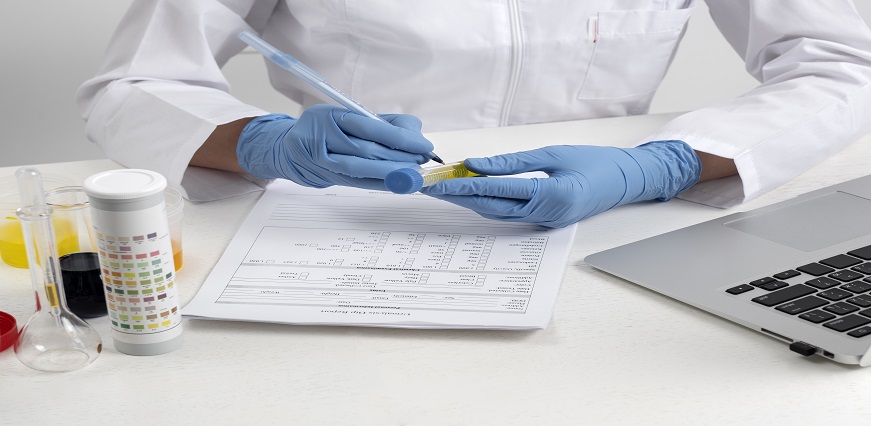

Max Lab > Lab Test in Panipat > Lab Test in Bandh > Non Invasive Prenatal Aneuploidies Screening (NIPT) Test
₹ 15000
10% OFF for Senior Citizens | USE CODE SS10 *
|
|
Non Invasive Prenatal Aneuploidies Screening (NIPT) Test |
|
|
Blood |
|
|
Doctor Prescription is must
|
|
|
|
|
₹ 15000 |
@3x.png) Description
Description
The Non-invasive Prenatal Testing (NIPT) is a prenatal screening test in Bandh, Panipat used to detect potential chromosomal abnormalities and other fetal health concerns. It provides expectant parents with early insights into their baby's genetic health. NIPT is a blood test in Bandh, Panipat recommended for all pregnant women, but especially those in certain categories with a higher risk of chromosomal abnormalities.
The NIPT Test is a sensitive screening test in Bandh, Panipat that primarily assesses the condition of Down syndrome (trisomy 21), Edwards syndrome (trisomy 18), and Patau syndrome (trisomy 13).
NIPT lab test in Bandh, Panipats can also detect abnormalities in sex chromosomes and other genetic conditions. While it's a valuable tool, it's important to remember:
NIPT is a screening test in Bandh, Panipat: It indicates an increased risk of an abnormality, but it's not diagnostic. Further test in Bandh, Panipating may be needed.
NIPT doesn't detect all abnormalities: It focuses on specific chromosomal conditions.
NIPT blood test in Bandh, Panipat reports can help in determining the sex of the fetus. Moreover, a non-invasive prenatal paternity test can be performed as early as the 7th week of pregnancy to determine the paternity of the fetus.
Unlike other invasive test in Bandh, Panipats like Chorionic villus sampling (CVS), amniocentesis, and percutaneous umbilical blood sampling, a basic NIPT test in Bandh, Panipat poses no risk to the fetus.
Chromosomal abnormalities can happen during fetal development or egg/sperm formation due to errors in cell division (meiosis or mitosis). While maternal age is a risk factor, these abnormalities can occur in pregnancies regardless of age or health history.
NIPT test can scan several key abnormalities and help doctors and parents-to-be to prepare for and manage pregnancy more effectively.
While there are no outward signs that indicate chromosomal disorders, pregnancies that are at a higher risk conditions include,
@3x.png) Description
Description
The Non-invasive Prenatal Testing (NIPT) is a prenatal screening test in Bandh, Panipat used to detect potential chromosomal abnormalities and other fetal health concerns. It provides expectant parents with early insights into their baby's genetic health. NIPT is a blood test in Bandh, Panipat recommended for all pregnant women, but especially those in certain categories with a higher risk of chromosomal abnormalities.
The NIPT Test is a sensitive screening test in Bandh, Panipat that primarily assesses the condition of Down syndrome (trisomy 21), Edwards syndrome (trisomy 18), and Patau syndrome (trisomy 13).
NIPT lab test in Bandh, Panipats can also detect abnormalities in sex chromosomes and other genetic conditions. While it's a valuable tool, it's important to remember:
NIPT is a screening test in Bandh, Panipat: It indicates an increased risk of an abnormality, but it's not diagnostic. Further test in Bandh, Panipating may be needed.
NIPT doesn't detect all abnormalities: It focuses on specific chromosomal conditions.
NIPT blood test in Bandh, Panipat reports can help in determining the sex of the fetus. Moreover, a non-invasive prenatal paternity test can be performed as early as the 7th week of pregnancy to determine the paternity of the fetus.
Unlike other invasive test in Bandh, Panipats like Chorionic villus sampling (CVS), amniocentesis, and percutaneous umbilical blood sampling, a basic NIPT test in Bandh, Panipat poses no risk to the fetus.
Chromosomal abnormalities can happen during fetal development or egg/sperm formation due to errors in cell division (meiosis or mitosis). While maternal age is a risk factor, these abnormalities can occur in pregnancies regardless of age or health history.
NIPT test can scan several key abnormalities and help doctors and parents-to-be to prepare for and manage pregnancy more effectively.
While there are no outward signs that indicate chromosomal disorders, pregnancies that are at a higher risk conditions include,

Asthma is a long-term disease in which the airways get narrow and cause swell...Read More

When it comes to the Indian diet, there are many foods that are good for dige...Read More

Vitamin A is a fat-soluble vitamin. It is used in the production of night vis...Read More

Having a dry cough is not uncommon. There may be several reasons behind a dry...Read More

Throat infection is a condition in which some kind of bacteria/virus or other...Read More

Blood in vomit, also known as hematemesis, can be a frightening sight. This i...Read More

If you experience anxiety on a regular basis, you’re not alone. In fact...Read More

A developmental disorder that impacts behaviour and communication is autism s...Read More

A medical disease known as obesity occurs when excess body fat builds up to t...Read More

Piles, also known as hemorrhoids, are swellings that develop in and around th...Read More

When an organ or tissue pushes through a weak spot in the muscles or surround...Read More

Headaches are a common problem that many people experience. There are many di...Read More

Pimples are a difficult skin problem to deal with. They can be unsightly and ...Read More

Dark circles under the lower eyelids can happen for a number of reasons like ...Read More

Stomach aches are not only uncomfortable, they can be disruptive as well. For...Read More

Low testosterone is a condition that can affect both sexes but is more common...Read More

Are you or someone you know suffering from arthritis? If so, then you are not...Read More

Man, I can't count the number of times that I've heard someone say &q...Read More

There are a number of different causes of vomiting, and it is also a common s...Read More

Home remedies for hair loss are treatments that you can do on your own and th...Read More

Loose motion is a very common problem that can affect people of all ages. It ...Read More

A mouth ulcer is a painful, sore that can appear inside your mouth. You might...Read More

A viral infection of the nose and throat causes the common cold. This can lea...Read More

Swelling and pain in the area around your tooth are two common signs that you...Read More

Diarrhea is a common symptom in many conditions, for example gastroenteritis....Read More

If you are suffering from a congested nose, you may be looking for remedies t...Read More

Snoring is a very common issue, affecting over half the population at some po...Read More

Anxiety disorders are the most common mental illness in India, affecting 40 m...Read More

If an individual is experiencing redness, itching, or irritation in their eye...Read More

If you're wondering what herpes is, then you've come to the right pla...Read More

Are you looking for a simple and effective way to promote healthy hair growth...Read More

Your immune system might be the culprit. It's the unsung hero that keeps ...Read More

Asthma is regarded as one of the most common non-communicable ...Read More

Feeling the heat of the sun on your skin signals that summer is, in swing. Wh...Read More

Hormones are chemical substances found throughout the body, produced by sever...Read More

Brain fog isn’t a formal medical condition; it’s more of a catch-...Read More

As the winter arrives and temperatures fall, the majority of people experienc...Read More